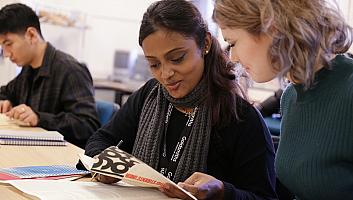BA (Hons)
English
Content navigation menu
Why study BA English at Goldsmiths
Our BA English degree gives you the opportunity to develop the critical and verbal skills needed for confident, effective reading of literary texts and criticism.
- Bold, flexible, and richly diverse – this degree will take you on a thrilling intellectual and imaginative journey. Along the way, we encourage you to ask big, complex, and often challenging questions about how to read literature in all its cultural, artistic, and political contexts.
- Hugely varied – you will travel across histories, cultures, and languages and be encouraged to engage in debates around, for example, gender and sexual identity, the Transatlantic slave trade, climate change, feminism, Caribbean writing, indigenous literature and philosophical ideas about what it means to be human across time.
- Design your own curriculum - read both traditional and non-traditional texts alongside other cultural works such as films, photography, museums, and visual arts.
- Transferable skills and careers support – our degree prepares you for a range of roles by developing your communication, analytical, and research skills. You’ll have the option to do a work placement as part of your course.
- Intensive pastoral care and academic support – we offer three years of support for your essay writing and research skills as well as a dedicated pastoral care system tailored to your individual needs.
- Experience London – our location allows you access to the wealth of cultural institutions and opportunities that the capital offers right on your doorstep.
Contact the department
If you have specific questions about the degree, contact Dr Carole Sweeney.
UCAS code
Q300
Entry requirements
A-level: BBB
BTEC: DDM
IB: 33 points overall with three HL subjects at 655
Length
3 years full-time or 4-6 years part-time
Fees
Home - full-time: £9250
Home - part-time: £4625
International - full-time: £19640
Department
What you'll study
Compulsory modules
In the first year, full-time students take the following compulsory modules:
| Module title | Credits |
|---|---|
| Explorations in Literature | 30 credits |
| Approaches to Text | 30 credits |
| Genre | 30 credits |
| Ideas in Practice | 15 credits |
| Creative-Critical Project | 15 credits |
Note about optional modules (if available): The above is indicative of the typical modules offered, but is not intended to be construed or relied on as a definitive list of what might be available in any given year. The module content and availability is subject to change.
Teaching style
This programme is taught through a mixture of scheduled learning - lectures, seminars and workshops. You’ll also be expected to undertake a significant amount of independent study. This includes carrying out required and additional reading, preparing topics for discussion, and producing essays or project work.
How you'll be assessed
You’ll be assessed by a variety of methods, depending on your module choices. These may include coursework, examinations, group work and projects.
Entry requirements
We accept the following qualifications:
A-level: BBB
BTEC: DDM
International Baccalaureate: 33 points overall with three HL subjects at 655
Access: Pass with 45 Level 3 credits including 30 Distinctions and a number of merits/passes in subject-specific modules
Scottish qualifications: BBBBC (Higher) or BBC (Advanced Higher)
European Baccalaureate: 75%
Irish Leaving Certificate: H2 H2 H2 H2
Alternative qualifications
See our full list of undergraduate entry qualifications.
We welcome students with a range of educational experiences. If you believe you may not meet the standard qualification requirements we would still encourage you to apply because we consider all aspects of your application when making a decision.
We’ll pay particularly careful attention to your personal statement, which is your opportunity to demonstrate your interest in the subject you’ve applied for. Your referees are also welcome to include any relevant contextual comments around your academic achievements. We’ll look at all these things when making a decision on your application, as well as your qualifications and grades.
International qualifications
We also accept a wide range of international qualifications. Find out more about the qualifications we accept from around the world.
If English isn’t your first language, you will need an IELTS score (or equivalent English language qualification) of 6.5 with a 6.5 in writing and no element lower than 6.0 to study this programme. If you need assistance with your English language, we offer a range of courses that can help prepare you for degree-level study.
Fees and funding
Annual tuition fees
These are the UG fees for students starting their programme in the 2024/2025 academic year.
- Home - full-time: £9250
- Home - part-time: £4625
- International - full-time: £19640
If your fees are not listed here, please check our undergraduate fees guidance or contact the Fees Office, who can also advise you about how to pay your fees.
It’s not currently possible for international students to study part-time if you require a Student Visa, however this is currently being reviewed and will be confirmed in the new year. Please read our visa guidance in the interim for more information. If you think you might be eligible to study part-time while being on another visa type, please contact our Admissions Team for more information.
If you are looking to pay your fees please see our guide to making a payment.
Funding opportunities
We offer a wide range of scholarships and bursaries, and our careers service can also offer advice on finding work during your studies. Find out more about funding your studies with us.
Additional costs
In addition to your tuition fees, you'll be responsible for any additional costs associated with your course, such as buying stationery and paying for photocopying. You can find out more about what you need to budget for on our study costs page.
There may also be specific additional costs associated with your programme. This can include things like paying for field trips or specialist materials for your assignments. Please check the programme specification for more information.
Careers
Getting you ready for work
Our graduates have a good employment record. Professions include:
- Publishing
- Journalism
- Public Relations
- Teaching
- Advertising
- Civil service
- Personnel
You can find out more about the career options available to you after you graduate on our English careers page.
Placements
You can choose to take a work placement module as one of your option modules in your second or third year. This module allows you to undertake a work placement which will benefit your studies, your skillset and your CV.
Find out more about we help you improve your employability while at Goldsmiths
Skills
You will learn to solve problems, to think critically and creatively, and to communicate with clarity.
This degree opens up a wide range of careers by developing your:
- Critical and analytical skills
- Proficiency in assessing evidence
- Clear expression of ideas
- Ability to bring together insights from a range of subjects
All of these are attractive to a variety of employers.



